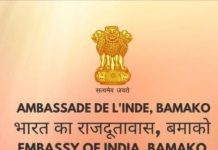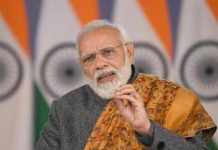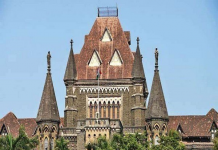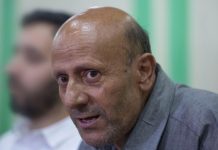Though Kamla Harris has celebrated her Indian roots whenever necessary and convenient, but US Prez-elect Trump is a natural ally and one the Modi govt would comfortably break bread with. by KUMKUM CHADHA
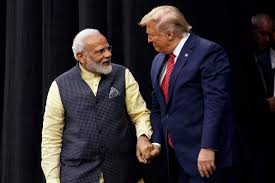
It was in 2019 that Prime Minister Narendra Modi had hailed US President Donald Trump and cheered for his re-election.
Prime Minister Modi had then reworded his own campaign slogan of ‘abki baar Modisarkar’ to ‘abki baar Trump sarkar’.
Trump had then joined the Indian Prime Minister at a mega event in Houston during his visit to the US.
That Union External Affairs Minister S. Jaishankar refuted the charge of Modi campaigning for Trump is another matter. Or Trump not winning that election. Jaishankar had also said that India has a “non-partisan” approach towards foreign leaders.
But that is History. The current scenario is that Trump has won the election and America has him as President for the second time.
As for India having a non-partisan approach towards foreign leaders as Jaishankar would have us believe, there is enough evidence to the contrary.
Nearer home, India was overtly friendly to the Sheikh Hasina regime in Bangladesh. India, to quote analysts, “over-invested in Hasina” which has cast a shadow over the bilateral relationship between the two countries under the new dispensation headed by Professor Mohd Yunus.
Further, her continued presence in India has led to a peculiar diplomatic challenge for India in developing a strong relationship with the new regime in Dhaka.
Air-dash to the USA, and the bonhomie between Modi and Trump is there for everyone to see.
Friendship between the leaders of the United States of America and India was in focus in 2020 at a cricket stadium in Modi’s home state Gujarat.
US President Donald Trump had then called Prime Minister Narendra Modi his “friend”. This followed the two exchanging half a dozen hugs throughout the day: “Modi…a man I am proud to call my friend”, Trump had then said.
Fast forward to 2024: Trump is back at the White House after trouncing Kamala Harris in what was an exciting and nail-biting election.
Within hours of Trump’s victory, Modi called “my friend” Trump and congratulated him on his win. Incidentally, he was among the first of world leaders to dial Trump after his decisive victory in the American Presidential polls.
Trump is reported to have called Modi a “magnificent man” adding that “the whole world loves PM Modi”.
Recently, he had dubbed Modi as a “total killer”. Heaping adjectives, Trump said that Modi was “the nicest human being”.
All eyes are on how this bonhomie and camaraderie will translate into transforming the Indo-US relationship in the years that follow.
It is well known that the Indo-US relationship transformed during Trump’s first term as President between 2016 and 2020. The focus was on strategic partnership. A common cause was to counter China’s growing influence globally.
During Trump’s first term as President, India and the US became closer than ever before. To quote media reports “India grew from being a strategic partner to an indispensable one”.
When Modi visited the White House in 2017, Trump promised that he would visit India during his Presidency: a promise that he fulfilled some three years later.
Meanwhile, the Trump administration backed India on issues of terrorism. It went as far as supporting Jaish-e-Mohammad Chief Masood Azhar being declared a “global terrorist”. Cooperation in sectors of defence and energy between the two nations were also significant. Of course, there were hiccups but the big picture was that the two nations were more in agreement than disagreement with each other.
Therefore, it is no surprise that the Trump win is being hailed as “good for India”.
However, there is skepticism on how things will pan out in Trump’s second tenure as President of the United States.
The bonhomie may continue but when it comes to strategic partnerships, the thumb rule is: “nation first”. In any case, Trump has, in foreign policy matters, always mooted for “America first.”
Therefore, for India and Indians to translate the Modi-Trump bonhomie into significant gains for India in future may be akin to jumping the gun.
The much-publicized friendship may be a favourable factor but whether it would lead to pro-India decisions is, as of now, uncertain.
However, on the face of it, the closeness, as one is compelled to dub the friendship, could spell continuity and deepening of economic ties to mutual benefit. Therefore, the India first and America first policy of the respective leaders may work in tandem rather than against each other.
Yet the past may not necessarily guide the future course. Trump does have an ambitious agenda for the second term which may or may not be the way India would like to see things pan out.
Trump wants to bring industrial activity back to the US which could adversely affect its trading partners including India. Also, Trump’s avowed policy of cracking down on illegal immigration could be a problem given that several thousand Indians have entered the US illegally through the borders of Canada and Mexico. Mass deportation of Indians could pose a huge problem, feel experts.
But these are tangible issues and have the scope of being resolved. However, what stares one in the face is Trump’s own unpredictability. In that context, India should be prepared for a few roadblocks and think twice before cheering Trump’s second tenure as President.
Having said that, as of now Trump is India’s best bet.
Pitch him against Kamala Harris and a negative that stares one in the face is the absence of her bonding with Prime Minister Modi. If anything, she has been critical of Modi’s revocation of Article 370 in Jammu and Kashmir.
Of course, she has celebrated her Indian roots whenever necessary and convenient but by way of explicitly spelling out policy initiatives aimed at India she has very little to show. Sum total: Trump is a natural ally and one the Modi government would comfortably break bread with.


